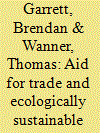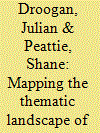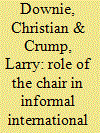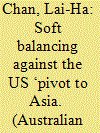|
|
|
Sort Order |
|
|
|
Items / Page
|
|
|
|
|
|
|
| Srl | Item |
| 1 |
ID:
155440


|
|
|
|
|
| Summary/Abstract |
In September 2015, Australia, along with 193 member states of the United Nations, signed the United Nations Sustainable Development Goals. The facilitation of international trade and increasing foreign aid for developing countries were emphasised as crucial means for achieving the Sustainable Development Goals. An important role was assigned to the international Aid for Trade initiative, which is about stimulating economic growth in developing countries through removing constraints to trade. Australia has been a strong supporter of the Aid for Trade initiative since it was launched at the World Trade Organization’s Ministerial Conference in Hong Kong in 2005. Aid for trade has become a central plank of the ‘new development paradigm’ of Australia’s international aid program. This article analyses the conceptualisation and practice of aid for trade in Australia’s aid, with a focus on how it links to ecologically sustainable development. It argues that Australia’s aid for trade is reinforcing the neo-liberal development paradigm in which environmental dimensions are overall neglected and private sector development and free trade are prioritised. In order to achieve international and national development goals of poverty reduction and sustainable development, environmental sustainability needs to be fully integrated into the growing aid for trade portfolio of Australia’s international aid.
|
|
|
|
|
|
|
|
|
|
|
|
|
|
|
|
| 2 |
ID:
155438


|
|
|
|
|
| Summary/Abstract |
The USA has long called for the complete, verifiable and irreversible denuclearisation of North Korea. But is this a realistic policy option? In order to address this question, a broader question needs to be answered: What are the primary drivers of North Korea’s interest in nuclear weapons? Most answers to this question take one of two basic positions. ‘Doves’, on the one hand, see North Korea developing nuclear weapons because of the threatening foreign policies of the USA and South Korea. ‘Hawks’, on the other hand, see North Korean nuclear development as driven by factors internal to the North Korean regime, inherent in its personality. The author examines these two arguments against the evidence and finds them both wanting. In contrast, he puts forth an alternative argument focused on the power of the global hegemon, the USA, and its position on the Korean Peninsula. This power and positional alternative is shown to be better reflected in the evidence presented.
|
|
|
|
|
|
|
|
|
|
|
|
|
|
|
|
| 3 |
ID:
155435


|
|
|
|
|
| Summary/Abstract |
Each year, Australia and China conduct something called the ‘High-Level Dialogue’, bringing together a cross section of senior officials, business people and civil society leaders. At the 2016 meeting, held in November in Beijing, the Chinese pressed for a qualitative intensification of the bilateral relationship, arguing that this would be a sensible response to the major new global uncertainties reflected in Brexit and Donald Trump’s success in the USA. We were urged to treat China as more than a business partner and encouraged to deepen mutual political trust
|
|
|
|
|
|
|
|
|
|
|
|
|
|
|
|
| 4 |
ID:
155437


|
|
|
|
|
| Summary/Abstract |
This article presents a thematic network analysis of Dabiq—a prominent English-language e-magazine produced by the Islamic State. Through formal qualitative analysis, the article examines the e-magazine’s first 13 issues in order to better understand its structure, evolution and intended audiences. In terms of structure, thematic network analysis provides a comprehensive and holistic understanding of Dabiq’s themes, identifying a range of concerns that are broader and more complex than is often supposed by academic and professional commentators. In terms of evolution, this analysis reveals a thematic landscape that has demonstrated considerable dynamism over four distinct phases throughout the magazine’s publication. In terms of understanding audiences, it is argued that Dabiq has been particularly engaged with the manipulation of group-level identities in an apparent attempt to garner support from global audiences. Themes related to allegiance, the group’s strengths and victories, and territorial expansion all feature consistently and prominently. They seek to create an in-group identity centred on victory, and to frame the Islamic State’s expansion and successes as a group achievement on behalf of Islam itself. Additionally, Dabiq provides the Islamic State with an opportunity to justify its actions and its religious authenticity to a broader Muslim audience, and thus provide the Islamic State with legitimacy beyond its borders. Recognising these thematic dynamics will be important for those engaged in counter-messaging and the development of counternarratives.
|
|
|
|
|
|
|
|
|
|
|
|
|
|
|
|
| 5 |
ID:
155439


|
|
|
|
|
| Summary/Abstract |
The Internet is an interconnected network and cyber security requires collective action. How that action is organised has important implications for national security, including the defence against cyber attacks and malicious activities. This article explains the origins and institutionalisation of cyber security in Australia—particularly ‘civilian cyber security’. The authors trace the origin of Australia’s first computer emergency response team and explain how this organisational form spread from the USA. Through it, Australia helped enable international cooperation. Domestically, however, the authors argue that the Australian government has struggled with the delegation, orchestration and abdication of responsibility for civilian cyber security, underinvesting in civilian organisations while overrelying on military and intelligence agencies. The history of this organisational field provides valuable insight into how to improve national policy and operations for cyber security.
|
|
|
|
|
|
|
|
|
|
|
|
|
|
|
|
| 6 |
ID:
155441


|
|
|
|
|
| Summary/Abstract |
Scholars of international relations have devoted significant effort to understanding international organisations. However, two areas have been understudied: the role of the chair in international multilateral negotiations and the role of informal international organisations. Yet informal international organisations are increasingly important in international affairs as world leaders turn to smaller and more flexible forums to address global challenges. This article addresses these two blind spots in the literature by considering the role of Australia as chair in one of the most important yet most understudied informal international organisations: the Group of Twenty (G20). Drawing on primary interview data and the participant observations of the first author, who was a member of the G20 chair in 2013–14 during Australia’s presidency, the authors examine two theoretical puzzles: (1) why states delegate control of the negotiation process to a chair and (2) how the chair can, and does, influence the negotiation process. It is argued that member states delegate control to the chair to overcome specific institutional failures and, in doing so, provide the chair with the power to influence the negotiation process. The authors also argue that the G20 case indicates that existing theory overlooks key factors which restrict the capacity of the chair to influence the negotiation outcome.
|
|
|
|
|
|
|
|
|
|
|
|
|
|
|
|
| 7 |
ID:
155436


|
|
|
|
|
| Summary/Abstract |
The existing accounts about the China-led multilateral development bank—the Asian Infrastructure Investment Bank (AIIB)—have focused on the USA’s policy concerns and the economic and commercial reasons for China having established it. Two deeper questions are left unaddressed: Was there any strategic rationale for China to initiate a new multilateral development bank and, if so, how effective is China’s strategy? From a neorealist balance-of-power perspective, this article argues that China has felt threatened by the Obama administration’s rebalance to the Asia-Pacific strategy. In response, China is opting for a soft-balancing policy to carve out a regional security space in Eurasia in order to mitigate the threat coming from its east. China’s material power, premised on the fact that the country is a huge domestic market and flush with cash, has proved irresistible for Asian states, with the exception of Japan, to be enticed away from the USA. On the one hand, this article adds weight to the claim that although the USA remains the pre-eminent military power in the Asia-Pacific, it has fallen into a relative decline in regional economic governance; on the other, China’s soft balancing has its own limitations in forming like-minded partnerships with, and offering security guarantees to, AIIB members. A China-led regional order is yet to have arrived, even with the AIIB.
|
|
|
|
|
|
|
|
|
|
|
|
|
|
|
|
|
|
|
|
|